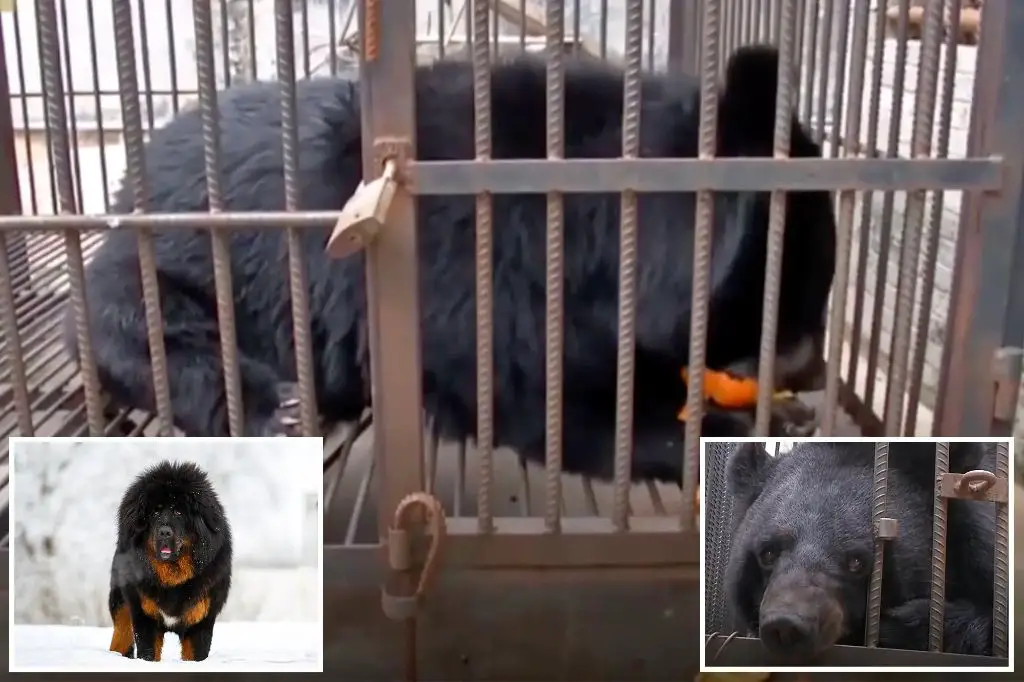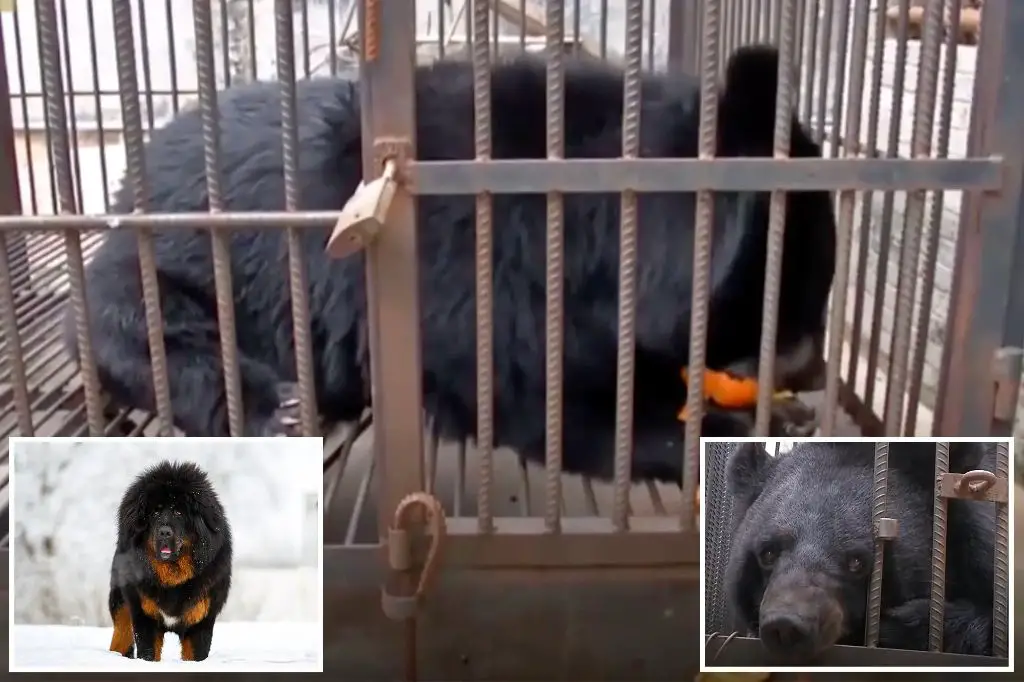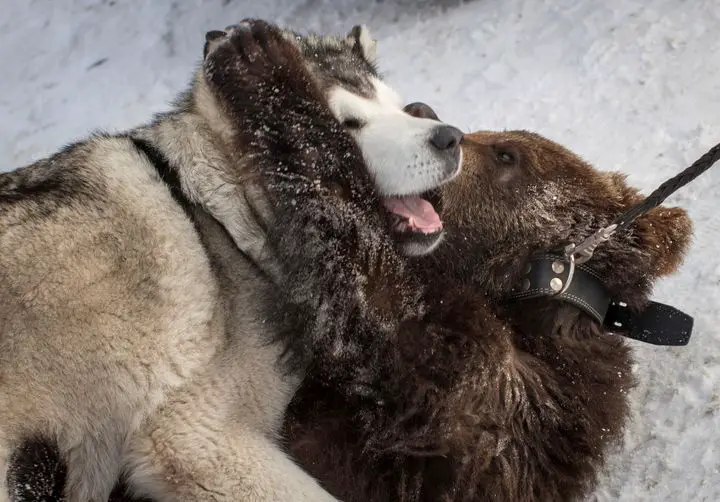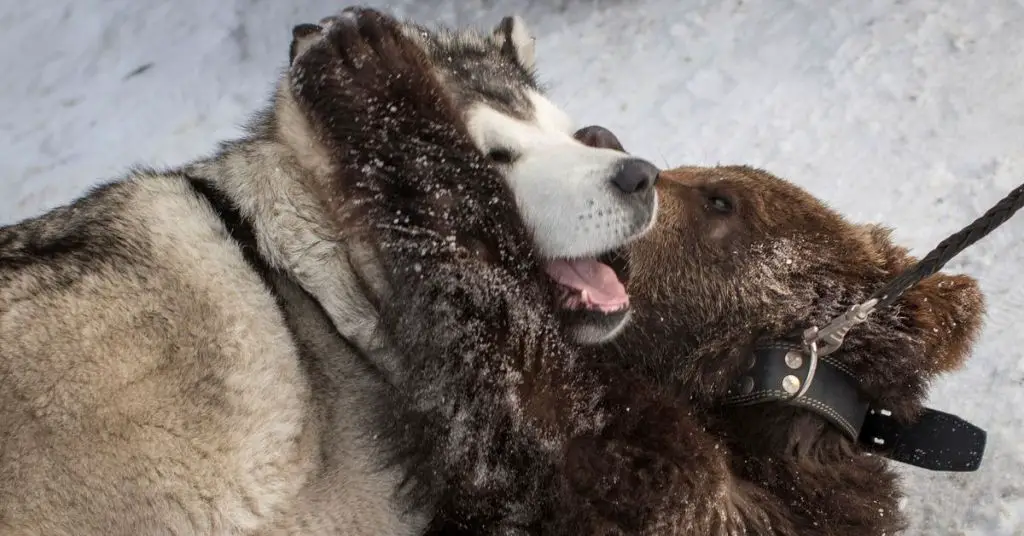Introduction
This incredible story took place in China, where a remote family adopted what they believed was an adorable Tibetan Mastiff puppy. Little did they know, they had actually welcomed a bear cub into their home! For two years, the family raised this “puppy” as part of their family, completely oblivious to the fact that it was growing into a massive Asian Black Bear. This heartwarming tale of an unusual “pet” adoption highlights the surprising similarities between bear cubs and dogs. When the truth was finally revealed, the family faced a difficult decision – return their beloved family member to the wild, or risk endangering their community by keeping a massive bear as a house pet.
The Adoption
In 2007, a family in Russia’s remote Pskov region found a tiny black puppy abandoned on their doorstep (Reuters Video). They decided to adopt the adorable pup, believing it to be a dog. The family described the puppy as active and playful, with an hearty appetite. Its black fur was soft and fuzzy. Though small, the puppy’s paws seemed a bit larger than a typical dog’s. As the weeks went by, the family noticed the puppy had some unusual behaviors. It was not interested in dog toys and preferred to play outside, climbing trees. The puppy was also incredibly strong for its size.
Growing Suspicions
The family first began to suspect something was unusual about their new pet within the first few months of bringing it home. According to an article on People.com, the father noticed the puppy had an unusually good sense of smell and was adept at climbing trees, uncommon traits for a dog. The family also remarked on the puppy’s voracious appetite – it seemed to eat constantly and was never satisfied.

As the puppy grew bigger and bigger, exceeding normal size ranges for its supposed breed, the family grew more suspicious. An article on NYPost.com stated that at around 2 years old, the “dog” weighed close to 250 pounds, walked around on its hind legs frequently, and showed no interest in toys or treats. The family realized this was highly abnormal canine behavior.
Despite their unease, the family became attached to their unusual pet and were in denial about its true identity. But its bear-like traits became harder to ignore as time went on.
Seeking Answers
As the family started to question if their pet dog could actually be a bear cub, they decided to consult some experts. According to an article from CKCU in 2018, the family brought their pet to a local wildlife organization to get examined https://ckcusa.com/blog/2018/may/family-shocked-to-discover-family-dog-is-actually-a-bear/. The experts at the wildlife center inspected the animal and did DNA tests to determine its species. Through careful examination, the wildlife experts were able to confirm that the family’s supposed dog was in fact a bear cub. The family was shocked at the discovery, after having raised the bear for months assuming it was just a puppy. While the wildlife center praised the family for taking action once they became suspicious, they stressed that exotic pets like bears should not be kept as family animals. After the discovery, the family cooperated in returning the bear cub to the care of the wildlife experts.
The Revelation

The family first began to suspect something was amiss when the dog reached 150 pounds and continued growing rapidly (source). Its appetite had grown voracious, and its temperament was becoming more unpredictable. When they sought answers from the animal dealer who had sold them the “dog,” the truth finally came out – they had actually purchased an Asiatic black bear cub! The family was shocked and dismayed to learn their beloved pet was not a dog at all.
Having raised the bear for two years, they had grown deeply attached to it as part of their family. The realization that they could not properly care for a wild bear was heartbreaking. However, they knew the bear needed to live in its natural environment. With heavy hearts, they made arrangements to return the bear to a wildlife rescue center equipped to meet its needs. It was an emotional goodbye for the family as they parted ways with the beloved animal they had nurtured from infancy. Though they had lost their pet, they took comfort knowing they had done the right thing for its wellbeing.
Returning the Bear
Once the family realized their “pet dog” was actually an Asiatic black bear cub, they knew they needed to take action to get the bear back to the wild safely. According to an article on People.com, the family contacted local police, who worked with wildlife experts to develop a plan to return the bear to the wild.

The wildlife experts advised the family to keep the bear indoors and feed it until arrangements could be made to transport it to a wildlife rescue center. Within a few days, forest rangers arrived at the family’s home with a cage and safely tranquilized the bear cub before transporting it to a nearby wildlife sanctuary.
At the wildlife sanctuary, veterinarians examined the bear cub to assess its health after living with a human family for two years. Luckily, the vets determined the bear was healthy overall and could be released back into the wild once it grew a bit bigger. The wildlife sanctuary provided a large enclosed space for the bear to roam safely as it acclimated back to life in the wild before its eventual release.
Why This Happened
In an article, background is provided on how the family was able to adopt a bear cub in the first place. Private ownership of endangered wildlife species like bears is illegal in China. However, regulations around ownership of exotic pets can be loosely enforced in rural areas. The family lives in a remote part of Yunnan province where it can be difficult for authorities to enforce laws strictly. Additionally, when the bear was a small cub it likely resembled a puppy, making it easier for the family to pass it off as a Tibetan mastiff breed of dog.
Lack of public awareness and education also played a role. The family was clearly uninformed about the legal and safety issues around exotic pet ownership. They also could not distinguish between a bear cub and a puppy. The government aims to increase education and tighten regulations to prevent similar cases of exotic wildlife purchases.
Lasting Impact
The experience of unknowingly raising a bear cub had a profound emotional impact on the family. As reported in the Daily Mail article (“We thought it was a puppy’: ‘Pet dog’ raised by Chinese family for two years turned out to be a BLACK BEAR”), the woman who cared for the bear cub was in shock and distressed when she realized the truth. Despite treating the animal like a beloved family pet for two years, the family recognized they could not safely keep a wild bear in their home. Letting go of the bear was extremely difficult emotionally. The family members had bonded deeply with the animal they believed was their pet dog. Having to give up the bear cub that they had bottle-fed, cuddled, and cared for since infancy was heartbreaking. Though doing the right thing by returning the bear to wildlife authorities, the family was left with sadness and a sense of loss. Their experience highlights the deep affection and attachment that can form between humans and wild animals when raised in captivity from a young age.

Expert Analysis
As surprising as this unique case of mistaken pet identity may seem, wildlife experts say such incidents are not unheard of. Unprepared owners can easily mistake bear cubs for more conventional pets like dogs. According to the Exotic Pet Suitability Guide from the World Wildlife Fund, bears require highly specific care and are unsuitable as pets for the average owner.
“Bear cubs may seem cute and cuddly when young, but they have complex needs that become very difficult to meet as they mature,” says zoologist Jane Smith from the Conservation Institute. “Their strength and wild instincts make them unpredictable and dangerous pets.”
Smith advises extreme caution for anyone considering an unconventional or exotic pet adoption. “Do your research, consult wildlife experts, and make sure you can provide the proper lifetime care required,” she says. “Otherwise, for the animal’s wellbeing and your own safety, it’s best to steer clear of species like bears that don’t belong in our homes.”
Conclusion
After finding Mr. Chocolate, the family was overcome with love and excitement at welcoming a new family member. As Mr. Chocolate grew, signs emerged that perhaps he was not a dog after all. Seeking answers from experts led to the shocking revelation that Mr. Chocolate was in fact a black bear cub. Though heartbroken, the family made the responsible choice to return him to wildlife authorities. This incredible story illustrates how easy it can be to mistake a wild animal for a domesticated pet when they are young. It’s a cautionary tale about properly identifying animals before taking them in. Key lessons learned include being wary of unknown animal breeders, thoroughly researching any new pet, and involving wildlife experts if there is any doubt. Though Mr. Chocolate’s time as a family pet was short, the story made a lasting impact on raising awareness about wildlife adoption.
